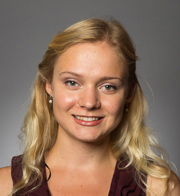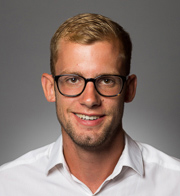This website uses cookies
We use cookies to ensure that we give you the best experience on our website. If you continue to use this site we will assume that you are happy with it.
On July 6, 2017, after months in detention and fearing a return to the country where she had been brutalized, one asylum seeker was given a reason to hope thanks to the work of two Cornell Law students. Participants in Cornell’s Asylum and Convention Against Torture Appellate Clinic, Alla Khodykina and Gavin Bosch had worked diligently with their client, a transgender woman who had fled to the United States from Mexico nearly twenty years ago and who now faces deportation. Their compelling arguments won her a second chance to fight for relief.

The client, who was assigned male at birth, says that in Mexico she endured regular beatings and repeated sexual assaults predicated on her feminine appearance and behavior, starting in early childhood. The abuse came from all sides: her family, her neighbors, her peers, and even law enforcement. The client testified that when she reached out to the police in Mexico for help after a particularly violent assault by her high school classmates, the officers themselves confined her for two days, starved her, and raped her, claiming, “This only happens to faggots like you.” Another time, as she was returning home from a quinceañera party, she was viciously attacked by members of a local gang. Again, when she sought help from the police, they dealt out only cruelty: five officers beat and kicked her to drive out her “faggot manners.”

After this last attack she fled to the United States, where she obtained both humanitarian asylum and permanent residency. Her troubles were not over, however. Because of the trauma she had endured, she suffered from multiple mental illnesses, including major depressive disorder and PTSD. She was also diagnosed with HIV.
She began to struggle with substance abuse and had minor run-ins with the law, serving brief stints in jail. A 2016 conviction for possessing a small quantity of methamphetamine instigated deportation proceedings.
In immigration court, she appeared alone, without representation. Citing her various convictions, as well as evidence that conditions in Mexico had improved for homosexuals, the immigration judge declined to consider humanitarian asylum and denied her relief under the United Nations Convention Against Torture.
It was at this point, as she faced deportation, that the Asylum Clinic learned of her predicament and took on her appeal to the Board of Immigration Appeals (BIA). Khodykina and Bosch began work on a brief. Since their client was detained at an ICE-contracted facility in Adelano, California, the students communicated with her mostly over the phone, though Khodykina did travel to meet her at one point. “Despite our client’s limited understanding of immigration law, she was very involved in her own case,” she says.
Bosch notes, “One of our biggest struggles was narrowing down which topics to focus on. There were a number of problems with the original immigration judge’s decision, but we had to eventually cut some weaker arguments away to create a concise, persuasive document.”
In their finished brief, the students argued that the immigration judge had mistakenly conflated sexual orientation with gender identity. While conditions in Mexico may have improved for homosexuals, transgender women continue to face heightened persecution there.
They also argued that the BIA should grant their client humanitarian asylum in recognition of the complex trauma she suffered in Mexico and the likelihood that, as a member of a marginalized group, burdened with mental and physical health complications, and with no system of support, she would likely suffer additional harm should she return.
The brief was successful. The BIA remanded the case to immigration court, where, the students hope, the judge will properly consider their client as transgender and grant her relief from deportation, allowing her to stay in the country that has been her home for almost two decades.